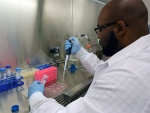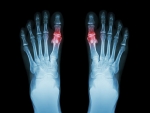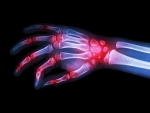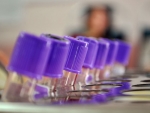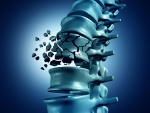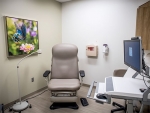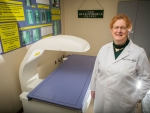Displaying items by tag: division of clinical immunology and rheumatology
UAB’s PREP Scholars proves successful by furthering student dreams as it receives a grant to continue preparing minority baccalaureate students for graduate programs.
Tagged under
- release
- graduate school
- college of arts and sciences
- department of biochemistry and molecular genetics
- department of biology
- department of cell developmental and integrative biology
- neuroscience
- department of genetics
- division of clinical immunology and rheumatology
- department of biomedical engineering
- school of engineering
- department of neurology
- school of medicine
A team of UAB researchers identified cholesterol-lowering therapies for rheumatoid arthritis patients at risk of developing cardiovascular disease.
Tagged under
Tagged under
A new study determines the cardiovascular safety of specific medications used to treat patients with gout.
S. Louis Bridges Jr., M.D., Ph.D., will serve as vice president of the Rheumatology Research Foundation.
Tagged under
A UAB researcher investigates how lupus develops and why certain demographics are at higher risk of flare-ups.
Tagged under
Four multidisciplinary studies will focus on genetics and associated mechanisms of hyperuricemia gout, an inflammatory arthritis.
Tagged under
John Mountz, M.D., Ph.D., and W. Winn Chatham, M.D., will be recognized by the ACR for education, research and clinical contributions to the field.
Tagged under
Researchers study the mechanisms that prevent autoimmune diseases like rheumatoid arthritis, systemic lupus erythematosus or multiple sclerosis after an infection.
Tagged under
A UAB study suggests a new bone boosting drug is more effective than commonly used bone loss medications in preventing fractures in women with osteoporosis.
UAB has created new clinical space with a $10 million renovation of the Whitaker Clinic at UAB Hospital.
The August issue of the journal focused on genomics in rheumatic diseases, the complex effort to understand the genetic underpinnings of more than 100 diseases that affect joints and muscles.
The Rheumatology Research Foundation’s Journey to Cure campaign funds eight rheumatology opportunities at the University of Alabama at Birmingham.
Tagged under
Following hip fracture increases after a reduction in reimbursement rates for DXA scans led to fewer scans, a UAB physician joined other advocates and successfully lobbied to increase DXA scan reimbursements to better identify and reduce hip fractures.
John D. Mountz, M.D., Ph.D., and Jasvinder A. Singh, M.D., have been awarded prestigious rheumatology awards for advances in basic and clinical research.
Tagged under
The National Osteoporosis Foundation has named leading rheumatologist Ken Saag from UAB as president of the group’s Board of Trustees.
Tagged under
UAB has implemented a new application suite to improve clinical trial management, and enhance communication among trial sites and with study participants.
Tagged under
A quality-control checkpoint in pre-B cells restricts the range of antibodies produced by mature B cells, and manipulation of the checkpoint could make vaccines more potent.
Tagged under
A pilot grant was recently awarded to UAB to investigate a noninvasive method of detecting neuroinflammation in rheumatoid arthritis.
Tagged under
